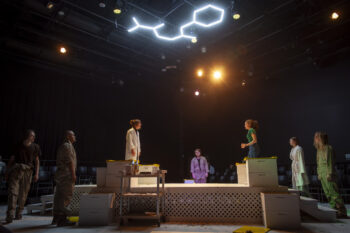“The Apiary” by Kate Douglas was performed at the Ankeny campus in the Black Box Theatre, located in Building 5. There were seven performances from October 3 to 12.
By the entrance, there was a coat rack with white lab coats that audience members were encouraged to wear during the performance. This production valued the audience and interacted with them throughout the play, such as giving the front rows flowers to hold.
“The Apiary” was an 80-minute show set 22 years in the future, where the bee population was dying, causing other plants to suffer greatly, to the point of extinction, with most of the plant life.
The play revolves around Zora, played by Brady Bardole, who has a job at a lab studying bees. She and Pilar, played by Annabel Grubb, work together to try to find a way to help the bees. They don’t have much luck until Cece and the old worker are found dead in the lab with a hive in her chest. Zora discovers that the bees benefited greatly from the corpse, and she and Pilar first bring in animals, then people, in order to test their hypothesis.
This play is not just about bees, but also the mental health of these characters. The ending of the play is summed up in such a devastating way; when Zorra breaks down, talking to the bees about anything, like Pilar told her to do. After Zorra begs Gwen to do the same. The play ends with both confessing everything until the lights cut out.
Zorra admits she feels like she has no meaning and has been desperately trying to find it. Gwen breaks down over losing her connection with her family.
The actors do a splendid job acting and bringing this story to life. The actors vividly expressed how the characters felt in the situation they were in. The actors filled that small room with their voices so well that you always felt immersed in the play.
I was able to go to the Saturday showing of this production, and I enjoyed the play immensely. This play drew people in to such an extent that you couldn’t look away. So much happened in what felt like a short 80 minutes.
After watching this play, the best word I could use to describe the play was “Intense.” This play was quite intense and dark, so much so that you needed a moment to collect yourself. And when this happens, you know you have watched a very well-performed play.
The setting of this show was simple, yet it was such a spectacle. They absolutely made the stage feel like a small lab filled with bees. During the play, they played a quiet buzzing sound that added to the feeling already there.
The sound crew made sure you could always hear bees, and when the bee ensemble came on stage, that buzzing was all you could hear. It was as if thousands of bees and their hives were in the room with you.
Without the help of Honey Hollow and their help with the equipment, the play would have felt incomplete. They provided the yellow topped bee hives for this production of the Apiary.
Kate Douglas wrote this play as a warning, like the ones she saw. In the program, they wrote Douglas’ warning clearly.
“The Synthetic apiary is not so much a triumph but a warming: a gleaming, white room where life persists because we forced it to.”
The bees are suffering even now, and after Douglas looked into it, she discovered what that could truly mean. If the bees went extinct, many plants would also go extinct because most plants are dependent on bees for pollination.
The Apiary is a cautionary play to warn others what our world could look like in just 22 years.






Comments